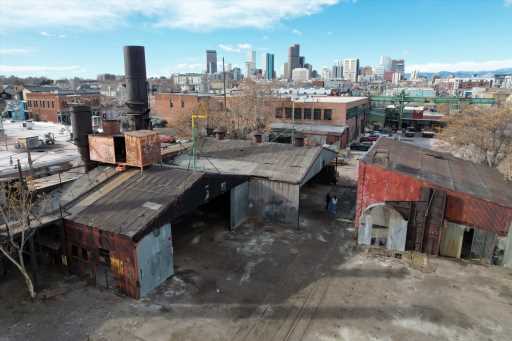Former RiNo salvage yard on Walnut Street to be Yota Yard distillery
A drive down Walnut Street in Denver’s River North Art District shows the neighborhood in a state of flux – popular businesses sit next to properties for lease, while construction teams toil on new sites. One developer plans to add to the district’s new vision by transforming an old salvage yard into a distillery, beer garden and more.
On Friday morning, Mike Mathieson, president of Forbes Partnership, walked around the future site of The Yota Yard at 3134 Walnut St., pointing out a 19th-century steel mill that he plans to restore as RiNo Distillery.
“This is probably my favorite project,” said Mathieson, who owns other properties in the area. “It’s just very unique.”
The RiNo neighborhood sits at a precarious crossroads within the city’s broader discourse about real estate development. On one hand, Denver’s suffering through a housing crisis, with a shortage of affordable living spaces that leave residents burned by rising prices. Throughout RiNo, new apartment buildings are opening at lightning speeds, with NOVEL RiNo at 1350 40th St. under construction now.
On the other hand, RiNo exists mainly within Five Points – Denver’s historically-Black neighborhood, referred to as the “Harlem of the West,” that’s struggling with gentrification. Some residents argue that RiNo is part of the problem, pricing out families who have resided in the area for generations.
RiNo operates in a state of advanced gentrification, which has taken place in the broader area – including Union Station North and Curtis Park – for at least 20 years, according to the Urban Displacement Project. The initiative defines the neighborhood as a hot market.
But it’s also a district that’s often sink or swim for businesses, particularly those that specialize in adult refreshments. Taproom and coffee bar Improper City at 3201 Walnut St. and River North Brewery at 3400 Blake St. have carved out their own niches in the neighborhood. But others, like Epic Brewing at 3001 Walnut St., recently shuttered their doors for good.
For Mathieson’s part, he doesn’t mind the competition.
“The other distilleries really add to it,” he said Friday. “Really, it becomes an area where people want to visit.”
He considers The Yota Yard to be a chance at saving a piece of Colorado history – once an old steel mill, then a salvage yard – that still stands on its original bones.
He’ll strengthen the soon-to-be distillery with steel beams, alongside other efforts to restore the property’s existing structures, including another building that will eventually host a taco bar. Mathieson also plans to keep the railroad tracks that run through the site.
But new elements will also be introduced, such as a two-story building serving beer with mountain views.
The project, which he estimates could cost around $15 million, is now awaiting permits to begin construction. That will likely take place at the beginning of next year, with a potential opening anticipated for either the end of 2024 or the start of 2025, Mathieson said.
Once it opens, he intends to hire around 200 employees.
His plan for the property was in the works for years after he first made the purchase almost a decade ago, he said. The COVID-19 pandemic forced a pause on the project, which picked up again about six months ago.
The distillery will produce canned cocktails, with flavors like elderflower-infused vodka and citrus-infused gin. Mathieson’s never worked on a distillery before, but aims to earn his distilling license.
Jennifer McDaniel, principal architect at Denver’s FLUENCY architecture + design, reached out to industry peers in Kentucky for insight on designing a distillery. She pointed to mixed-use event space Armature Works in Tampa, Fla., as an inspiration for The Yota Yard as an “inside-outside experience, utilizing old bones with new architecture.”
So far, she’s considered public reception to be positive. “I’ve only heard people get excited about it,” McDaniel said in a Friday phone interview.
The Denver site will also provide entertainment to guests, including live music and outdoor events.
“This is an area that is really the No. 1 entertainment area in a five-state region,” Mathieson said. “There’s a lot of draw to this old warehouse district.”
One of his other properties includes an apartment building down the street, which will span almost 300 units.
“There’s a desire to live here. There’s not a lot of housing,” he said. “To have an ecosystem, you gotta have places for people to live, places for people to work and places for people to be entertained.”
As one distillery plans to pop up in Denver, another is leaving the city’s scene.
Archetype Distillery is set to move to a new development – the Rocky Mountain Commercial Park – in Gypsum, with construction currently underway. The team will only distill its gin and vodka for a few more months at its 119 S. Broadway location in Denver.
Co-owner Wade Murphy explained his reasoning as easy expansion and the ability to double production capacity.
“I grew up in Denver but spent half my childhood in Vail,” said co-owner and master distiller Michael Chapyak. “Coming back to this area feels like coming home.”
Get more business news by signing up for our Economy Now newsletter.
Source: Read Full Article



